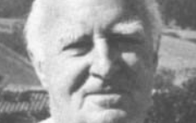Arthur Guirdham (1905–1992) was an English psychiatrist and author. He attracted notice in the 1970s with books claiming the group reincarnation of members of the Cathars, a medieval French Christian sect of which he believed himself to have been a member in a previous life.
Life and Early Career
Arthur Guirdham was born on 9 March 1905 in Workington, Cumberland (Cumbria) into a working-class family, his father working in the steel industry. He gained a scholarship to Keble College, Oxford and trained as a psychiatrist at Charing Cross Hospital, London. He worked as a senior consultant psychiatrist in the Bath Child Guidance Clinic until his retirement in 1968.
Guirdham was an early advocate of research into the links between disease and the stresses of modern life. He authored novels and poetry, and, in the later part of his career, books about history and reincarnation.
Reincarnation
In later life Guirdham became intrigued by the possibility of reincarnation. This followed an encounter with a patient which he described in his book The Cathars and Reincarnation (1970).1Guirdham (1970). The patient ‘Mrs Smith’, who had been referred to him for treatment for epilepsy, believed herself to be psychic and reported vivid nightmares of life as a peasant girl in thirteenth century France. The girl’s family had befriended a priest named Roger de Grisolles who was arrested and died in prison, while she herself was burned at the stake.2Wilson (1973). After meeting Guirdham, Smith believed him to have been de Grisolles in a previous life.
Guirdham had experienced similar nightmares since childhood and was sufficiently impressed with the factual aspects of Smith’s narrative to undertake research into the Cathars. This was a Christian gnostic movement that flourished in southern France in the late medieval period. The Cathars’ beliefs were markedly at odds with orthodox Christianity and they were persecuted by the French religious authorities, culminating in their final destruction in 1244 at Montségur, when 200 Cathars were burned alive on one day. Guirdham said he was able to confirm the veracity of events and individuals described in Smith’s nightmares, including the death in 1242 of de Grisolles. He discovered that Smith’s own notes contained background material on the Cathars which was not then known to scholars and was only later verified.
In a later book We Are One Another (1974), Guirdham gave details of further evidence provided by a Miss Mills, who reported past life memories of a similar nature, and a child’s notebook which contained drawings said to name people and places appropriate to the same period.3Guirdham (1974). Here he developed the idea of what he called ‘the labyrinth of group reincarnation’,4Cited in Woolger (1974), 386. a form of group communication from the past by psychic means.
Criticism
Guirdham’s claims about reincarnation attracted wide public notice, but were viewed with suspicion by critics, including some who were not necessarily unsympathetic to parapsychology. Jungian analyst Roger Woolger objected to the ‘misty psychic romanticism’ of his books and complained that he seemed ‘possessed … by a Cathar idée fixe’.5Woolger (1974), 387.
David Christie-Murray, a teacher and Anglican priest, wrote:
Here was a man of scientific training, a confessed sceptic until his late fifties, in whom there was nevertheless always a conflict between the intellectual and the psychical, in which the latter finally overwhelmed the former. He seems to have been a man in whom an interest became an obsession which drove him into an inability to distinguish between historical fact and mis-interpretative fantasy.6Christie-Murray (2002), 276.
Guirdham defended his views in a BBC documentary7The Time Travelers of Bath (1980). where he maintained that the accuracy of the details presented by his interviewees was beyond question and that they could not have known the information they conveyed through normal means.
Selected Books
Disease and the Social System (1942). London: George Allen & Unwin Ltd.
A Theory of Disease (1957). London: George Allen & Unwin Ltd.
Christ and Freud: A Study of Religious Experience and Observance (1959). London: George Allen & Unwin Ltd.
Man: Divine or Social (1960). London: Vincent Stuart Ltd.
The Nature of Healing (1964). London: George Allen & Unwin Ltd.
The Silent Union: A Record of Unwilled Communication (published under the pseudonym of Francis Eaglesfield) (1966). Stuart & Watkins.
The Cathars and Reincarnation (1970). London: Neville Spearman.
Religious Aspects of Extra-sensory Perception (1971). London: The Churches’ Fellowship for Psychical and Spiritual Studies.
Obsession: Psychic Forces and Evil in the Causation of Disease (1972). London: Neville Spearman.
A Foot in Both World’s: A Doctor’s Autobiography of Psychic Experience (1973). London: Neville Spearman.
We Are One Another: A Record of Group Reincarnation (1974). London: Neville Spearman.
The Lake and the Castle (1976). London: Neville Spearman.
The Great Heresy: The History and Beliefs of the Cathars (1977). London: Neville Spearman.
The Psyche in Medicine (1978). London: C.W. Daniel Co. Ltd.
Paradise Found: Reflections on Psychic Survival (1980). Wellingborough: Turnstone Press Ltd.
The Island (1980). London: Neville Spearman.
The Psychic Dimensions of Mental Health (1982). Wellingborough: Turnstone Press Ltd.
Melvyn Willin
Literature
Christie-Murray, D. (2002). Review of The Cathars and Arthur Guirdham by Lynda Harris. Journal of the Society for Psychical Research 66/4, 276.
Guirdham, A. (1970). The Cathars and Reincarnation. London: Neville Spearman.
Guirdham, A. (1974). We Are One Another: A Record of Group Reincarnation. London: Neville Spearman.
(The) Time Travelers of Bath (1980). Presented by H. Lincoln. BBC.
Wilson, C. (1973). Strange Powers. New York: Random House, 1973.
Woolger, R. (1974). Review of A Foot in Both Worlds by Arthur Guirdham. Journal of the Society for Psychical Research 47, 386-87.
